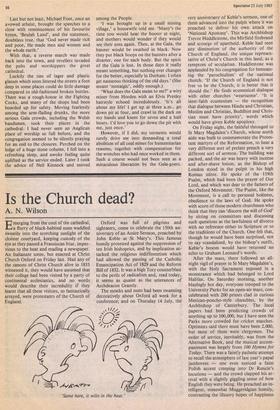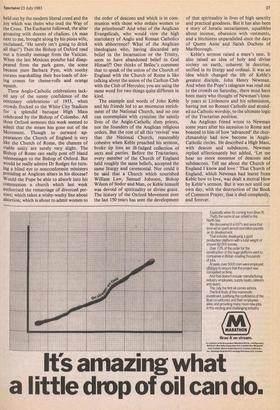Is the Church dead?
A. N. Wilson
Emerging from the cool of the cathedral, a flurry of black-habited nuns waddled sweatily into the scorching sunlight of the cloister courtyard, keeping custody of the eye as they passed a Fransiscan friar, imper- vious to the heat and reading a newspaper. An Italianate scene, but enacted at Christ Church Oxford on Friday last. Had any of the canons of Christ Church alive in 1833 witnessed it, they would have assumed that their college had been visited by a party of continental ecclesiastics, and no words would describe their incredulity if they learnt that all these visitors, so fantastically arrayed, were protestants of the Church of England.
Oxford was full of pilgrims and sightseers, come to celebrate the 150th an- niversary of an Assize Sermon, preached by John Keble at St Mary's. This famous homily protested against the suppression of ten Irish bishoprics, and by implication at- tacked the religious indifferentism which had allowed the passing of the Catholic Emancipation Act of 1829 and the Reform Bill of 1832. It was a high Tory counterblast to the perils of radicalism and, read today, it seems as quaint as the utterances of Archdeacon Grantly.
The monks and nuns had been swanning decoratively about Oxford all week for a conference; and on Thursday 14 July, the 'Same here, it wills in the heat.' very anniversary of Keble's sermon, one of them advanced into the pulpit where it was preached to deliver his own attack on 'National Apostasy'. This was Archbishop Trevor Huddlestone, the Mirfield firebrand and scourge of apartheid. Keble had seen any diminution of the authority of the Church of England, the unique represen- tative of Christ's Church in this land, as a symptom of secularism. Huddlestone was applauded by his congregation for bemoan- ing the 'parochialism' of the national church. 'If the Church of England is not free to be the Church, it is better that it should die.' He finds ecumenical dialogue with other churches 'wearisome'. 'It is inter-faith ecumenism — the recognition that dialogue between Hindu and Christian, Muslim and Christian, Buddhist and Chris- tian must have priority', words which would have given Keble apoplexy.
On Friday night, the faithful thronged to St Mary Magdalen's Church, whose north aisle was built to commemorate the Protes- tant martyrs of the Reformation, to hear a very different sort of prelate preach a very different sort of sermon. The building was packed, and the air was heavy with incense and after-shave lotion, as the Bishop of London stood in the pulpit in his high Roman mitre. He spoke of the 119th Psalm, which had been the prayer of Our Lord, and which was dear to the fathers of the Oxford Movement. The Psalm, like the Movement, is a call to personal holiness, obedience to the laws of God. He spoke with scorn of those modern churchmen who think that they can 'discern the will of God' by sitting on committees and discussing such questions as the lawfulness of divorce with no reference either to Scripture or to the traditions of the Church. One felt that, though he would have been surprised, not to say scandalised, by the bishop's outfit, Keble's bosom would have returned an echo to Graham Leonard's words.
After the mass, there followed an all- night vigil of prayer in St Mary Magdalen's, with the Holy Sacrament exposed in a monstrance which had belonged to Lord Halifax. On Saturday morning, another blazingly hot day, everyone trooped to the University Parks for an open-air mass, con- celebrated with 200 priests clad in curious Mexican-poncho-style chasubles, by the Archbishop of Canterbury. The local papers had been predicting crowds of anything up to 100,000, but I have seen the Parks more crowded for cricket matches. Optimists said there must have been 2,000, but most of them were clergymen. The order of service, inevitably, was from the Alternative Book, and the musical accom- paniment was largely from 100 Hymns for Today. There was a faintly pathetic attempt to recall the atmosphere of last year's papal jamborees — one even noticed a faint Polish accent creeping into Dr Runcie's locutions — and the crowd clapped his ar- rival with a slightly giggling sense of how English they were being. He preached an in- telligent, somewhat Muggeridgian homily, contrasting the illusory hopes of happiness
held out by the modern liberal creed and the joy which was theirs who trod the Way of the Cross. The Eucharist followed, the altar groaning with dozens of chalices. (A man next to me, brought along by his pious wife, exclaimed, 'He surely isn't going to drink all that!') Then the Bishop of Oxford read out a friendly message from the Vatican. When the last Mexican poncho had disap- peared from the park gates, the scene became pure Barbara Pym, with toothy curates marshalling their bus-loads of dot- ing crones for cheese-rolls and orange squash.
These Anglo-Catholic celebrations lack- ed any of the sunny confidence of the centenary celebrations of 1933, when crowds flocked to the White City Stadium for a splendid baroque High Mass celebrated by the Bishop of Colombo. All three Oxford sermons this week seemed to admit that the steam has gone out of the Movement. Though to outward ap- pearances the Church of England is very like the Church of Rome, the chances of viable unity are surely very slight. The Bishop of Rome can easily post off bland telemessages to the Bishop of Oxford. But would he really admire Dr Rodger for turn- ing a blind eye to nonconformist ministers presiding at Anglican altars in his diocese? Would the Pope be able to absorb into his communion a church which last week authorised the remarriage of divorced per- sons; which takes a wishy-washy line about abortion; which is about to admit women to the order of deacons and which is in com- munion with those who ordain women to the priesthood? And what of the Anglican Evangelicals, who would view the high mariolatry of Anglo and Roman Catholics with abhorrence? What of the Anglican theologians who, having discarded any belief in the Incarnation or the Trinity, seem to have abandoned belief in God Himself? One thinks of Belloc's comment that to speak of the union of the Church of England with the Church of Rome is like talking about the union of the Carlton Club with the Club of Hercules; you are using the same word for two things quite different in kind.
The example and words of John Keble and his friends led to an enormous enrich- ment of the National Church, and no one can contemplate with cynicism the saintly lives of the Anglo-Catholic slum priests, nor the founders of the Anglican religious orders. But the cost of all this 'revival' was that the National Church, reasonably cohesive when Keble preached his sermon, broke up into an ill-fadged collection of sects and parties. Before the Tractarians, every member of the Church of England held roughly the same beliefs, accepted the same liturgy and ceremonial. Nor could it be said that a Church which nourished William Law, Samuel Johnson, Bishop Wilson of Sodor and Man, or Keble himself was devoid of spirituality or divine grace. The history of the Oxford Movement over the last 150 years has seen the development of that spirituality in lives of high sanctity and practical goodness. But it has also been a story of lunatic sectarianism, squabbles about incense, obsession with vestments, and a bitchiness unparalleled since the days of Queen Anne and Sarah Duchess of Marlborough.
Keble's sermon raised a mare's nest. It also raised an idea of holy and divine society on earth, coherent in doctrine, unified in its liturgy and ordinal. It was an idea which changed the life of Keble's greatest disciple, John Henry Newman. And when the Pope's telegram was read out to the crowds on Saturday, there must have been many who thought of Newman's lone- ly years at Littlemore and his submission, having met no Roman Catholic and attend- ed no Catholic worship, to the ultimate logic of the Tractarian position.
An Anglican friend wrote to Newman some years after his secession to Rome and boasted to him of how 'advanced' the chur- chmanship had now become in Anglo- Catholic circles. He described a High Mass, with deacon and subdeacon. Newman replied affectionately but added, 'Let me hear no more nonsense of deacons and subdeacons. Tell me about the Church of England I know and love.' That Church of England, which Newman had learnt from Keble how to love, was dealt a mortal blow by Keble's sermon. But it was not until our own day, with the destruction of the Book of Common Prayer, that it died completely, and forever.







































 Previous page
Previous page